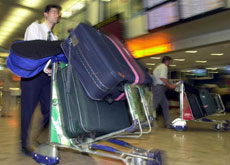Swiss passengers spared scrutiny – for now

From Wednesday, European Union airlines are obliged to pass on extra passenger information to US authorities for transatlantic flights.
But Switzerland’s national carrier, Swiss, won’t be following suit for the moment.
Daniel Göring, spokesman for the Federal Office for Civil Aviation, said the Swiss government had yet to receive a request from the US to provide additional information about transatlantic passengers.
“Until now, the Federal Office for Civil Aviation hasn’t received any request from the US authorities,” Göring told swissinfo.
“As soon as we get such a request, we have to check what kind of data could be provided to the US. We also have to check whether it is compatible with the data protection laws.”
A spokesman for Swiss, Manfred Winkler, said the national airline would comply with the US demands, but that it was still trying to establish precisely what information is required and how the procedures will work.
“Swiss has been in contact with US authorities about the matter,” Winkler told swissinfo.
“We have, to date, not received the information we requested about the kind of passenger data we might forward to the US in the future.”
He added that Swiss would need 30 days notice to implement any changes.
Winkler said Swiss had not encountered any problems with passengers arriving in the US on Wednesday.
Wide-ranging
Under the terms of the accord, EU airlines must pass on passenger background information to US authorities, ranging from credit card details to religious affiliation and even eating habits.
Within the US, measures will go as far as rating passengers’ risk potential according to a three-colour system: green, yellow and red. “Red” passengers would not be permitted to fly.
European airlines that omit passenger information could be fined by the US.
Data protection
The new measures, ordered by Congress after the September 11 attacks, have come under fire from both civil liberties groups and airlines, which say the checks could infringe privacy laws and lead to delays in airports.
“Swiss has been trying for months to get a response from the federal authorities in Switzerland about whether providing access to passenger information has implications for data protection laws,” Winkler noted.
Hassle
William Gaillarde, head of corporate communications for the International Air Transport Association (IATA) in Geneva, says that airlines are largely unhappy about the move.
“We still have some objections to some of the requirements as they represent a burden that right now the airlines will find it difficult to carry – given the financial state they’re in,” he told swissinfo.
Giallarde says the measures also present numerous practical difficulties.
“We’ll need an extra one minute for each passenger during check-in,” he says. “If you have to check in a large aircraft with 350 passengers, you can imagine the kind of pressure it’ll put us under.”
The latest batch of security checks will also represent “an extra hassle” for passengers who have already been subjected to a string of new security checks since September 11, says Gaillarde.
Fines
According to Gaillarde, airlines may unwittingly fall foul of the regulations because passengers may often not be able to answer all the security questions put to them.
The airline could then be heavily fined by the US government for failing to pass on data.
“If a passenger cannot say where he’ll be staying during his trip – as is often the case with tourists – or if he cannot speak the language of the check-in staff, we won’t be able to get the information we need,” he explains.
“In the past, we’ve had to pay heavy fines to the US because of immigration issues and this is yet another reason for us to be fined,” he continues. “We don’t feel that this is fair.”
Gaillarde adds that ultimately “it’s the passengers who’ll pay the price”.
However, it’s unlikely that non-compliance by the airlines could result in more drastic penalties, such as the US withholding landing rights.
“If an airline was unable to comply because of national laws, that would be a matter between the two governments.”
Giallarde says the latest measures could have a negative impact on transatlantic air travel, which has already seen falling passenger numbers since September 11.
swissinfo, Vanessa Mock
For the time being, passengers travelling on Swiss will be spared stringent security checks imposed on other European airlines by the US authorities.
From March 5, EU airlines are obliged to pass on passenger background information to US authorities, ranging from credit card details to meal preferences.
Swiss said it would not be implementing the measures until details had been finalised.
European airlines that omit passenger information could be fined by the US.

In compliance with the JTI standards
More: SWI swissinfo.ch certified by the Journalism Trust Initiative









You can find an overview of ongoing debates with our journalists here . Please join us!
If you want to start a conversation about a topic raised in this article or want to report factual errors, email us at english@swissinfo.ch.